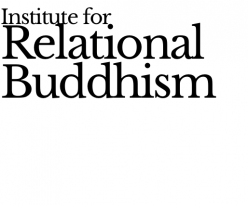Relational Buddhism & Karma Transformation
Vision & Mission
I. By proposing Relational Buddhism and Karma Transformation, the wedding of Pan-Buddhist teachings, Social Construction, and Relational Being as championed by K.J. Gergen, we aspire no less than realizing the “Fourth Turning of the Dharma Wheel” after the first turning by the Buddha (Middle Way practice), the second turning by Nagarjuna (Emptiness-Only philosophy) and the third turning by Vasubandhu (Mind-Only epistemology).
Viewing mind as located in-between people marks a move beyond brain and religion towards applying psychology as a vehicle for Buddhism, thus called Buddhism 4.0, Karma Transformation of body-mind/speech is the centerpiece of Buddhist Psychology/therapy aimed at changing intentional action from the unwholesome to the rational.
Transforming detoxifies poisonous greed, hatred and ignorance on the mind’s functioning and illusory self. While greed comprises fear of loss and grief re the lost, hatred includes anger and aggression, all of which might eventually result in self-blame/pity, remorse/guilt and depression. Greed accrues banksters, hatred extremists‘ conflicts.
II. By this fourth 21st century turning, some 100 generations after Siddharta Gautama the Buddha, we aim at offering and inspiring scholars, healthcare/clinical practitioners and professional life/career coaches, as well as the general public at large with a comprehensive roadmap to deal with existential suffering of everyday life, in the private and professional domains and in the context of relationships toward others and oneself through a modus vivendi in line with what the Buddha had taught in equanimity of loving-kindness, empathic compassion and shared joy. Thus, Buddhism 4.0 helps cleansing the earth’s atmosphere from detrimental energies.
Charter
I. “We can’t share our brains, but we can’t but share mind…” The Psychology of Relational Buddhism is a cutting-edge practical understanding of life rooted in two trailblazing paradigms: (1) mind is not gridlocked in the skull but spaced outside the body in-between people’s interactions and (2) all that is observed in science (and noted in mindfulness) are conceptualizations which boil down to social constructions shaped as perception, imagery, or cognition (covert self-dialogue), only meaningful in the interpersonal context/milieu where they occur.
II. Living in an ocean of relationships from the cradle to the grave, it is pivotal to soak views and speech in vernacular reflecting interpersonal significance of binding “we”. In Dependent Origination, through parental lustful intercourse (karmadathu), sensing-emoting/thinking-talking capability isembodied.Speechgets form by the syllable during meaning-making exchange (rupadathu). As “languaging” progresses formless thoughts transform into fickle mind (arupadathu) and self-organize illusory “independent self” that fails to see inseparable “selves” spaced-in-between-people-embedded-in-culture.
III. Thus, at bottom, to act is to inter-act and to be is to inter-be (Avatamsaka Sutra): “I am linked, therefore I am” (K.J. Gergen). In effect, thinking is relational activity executed as covert-private verbalized/visualized speech. Usually unbeknownst, intentional or premeditated action (karma) arises non-independently, moves Body/Speech/Mind, and could result in psychological malaise. Emotions around birth, aging, illness, and death are – like separation from loved ones, union with unloved ones, and not attaining goals – relational performances of affect: creative scenarios expressing socio-cultural meaning.
IV. If self/soul and autonomous mind are fictions (though functional as index), singing alone, dreaming intimately, or retreating solitarily is social-affective expression. In search for awakened mind (absolute bodhicitta), we encounter the smallest unit of experience (dharma). Conceived as “neither-empty-nor-not-empty” (the Buddha, 6th century BCE), “empty-of-emptiness” (Nagarjuna, 2nd century), and “empty-non-duality” (Vasubandhu, 4th century), dharma is now fathomed as “social-construction-empty-of-Transcendental Truth”, a provision wedded to K.J. Gergen’s Relational Being.
V. Relational Buddhism invites the co-creation of inter-mind-in-between-selves and of a “non-foundational morality of coordinated action” to render “team spirit for humanity” with congenial bonds as lifeline. Imbibed in-depth, this mentality (in line with the Gandavyuha Sutra) will likely ennoble us, whenever mind blowing AHA and HAHA transform karma (through BLABLA). In synergy with the UN-adage “think globally, act locally”, we might want grass-root collaborative practice toward bottom-up societal harmony by realizing awakened mind of loving-kindness (relative bodhicitta) via on-going front-burning mindfulness of speech, including self-speech/self-talk.
Want to start online therapy now? Find an online therapist now, and start your therapy today!


wow this is andrew i read this
and got your email
lucky you are a practitoner as am i
i can live with my will on this planet without abode but to do more
for all sentient beings is more arduos
Thanks for posting Andrew, dear colleague…